voa标准英语2008年-Ukraine Seeks Nationwide Linguistic Revival
搜索关注在线英语听力室公众号:tingroom,领取免费英语资料大礼包。
(单词翻译)
The collapse1 of the Soviet2 Union left a complex mixture of ethnic3 groups in republics of the former empire. Their common language, Russian, expanded at the expense of native languages, which former Soviet republics are seeking to revive. Ukraine is demanding that students pass college entrance exams in Ukrainian, and the language is taught in all of the country's elementary and high schools. But as VOA Correspondent Peter Fedynsky reports, the effort involves practical obstacles, even outright4 hostility5 from some who are content to speak Russian.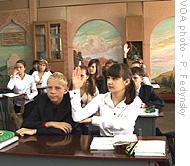 |
| Ukrainian literature class at Russian School #25 in Simferepol |
A Ukrainian literature class in the Crimean city of Simferopol at School Number 25, where all other subjects are taught in Russian. Ukrainian is not the first language of these students, some of whom reveal greater proficiency6 than others. Eleventh grader Arthur Trotsky feels comfortable in both languages.
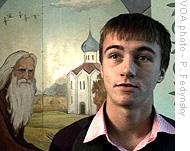 |
| Arthur Trotsky |
Arthur says there are people who do not like the Ukrainian language - basically grownups, because it is difficult for them to adapt. He says that children, however, are learning Ukrainian in school from grade one, and some even study it in depth. He adds that while older people are opposed, young ones support the Ukrainian language.
The vast majority of schools in Crimea use Russian for all subject matter, except Ukrainian. Raisa Masliuk, the principal of School #25, says if parents demanded that more courses be taught in Ukrainian, she would respond accordingly.
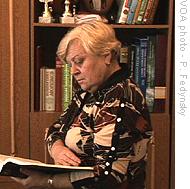 |
| Raisa Masliuk - Principal of Russian School #25 |
Masliuk says if there was a need to introduce Ukrainian classes, she would already be involved in personnel decisions, but her school does not face that issue. She says there are no applications that indicate children want to study in Ukrainian.
Demand for all-Ukranian schools increasing
But demand for all-Ukrainian schools in Crimea is slowly increasing. The 842 students at the Ukrainian School (Gymnasium) on the outskirts7 of Simferopol exceed the building's capacity. Half of the pupils are ethnic Russians and many have been turned away for lack of space.
Principal Natalia Rudenko says Crimean colleges do not prepare teachers for specialized8 Ukrainian language instruction.
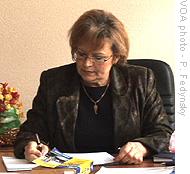 |
| Natalia Rudenko - Principal of Ukrainian school in Simferopol |
Rudenko says colleges prepare teachers of Ukrainian language and literature, but not subjects such as history, mathematics and physics, which makes it difficult for all concerned. The administrator9 says the school tries to get around the problem by searching for teachers and instructing them on the spot in the local Ukrainian language community.
Teacher shortage breeds resentment10
This teacher shortage breeds resentment among those who are otherwise favorably disposed to the Ukrainian language. Emine, a Crimean Tatar, is a student at the Ukrainian Publishing Academy in Simferopol.
Emine says teaching chemistry in Ukrainian, for example, is very difficult for the teacher and even more difficult for the student to understand. She notes that everything between Ukrainian and Russian is different - different words and different letters, which makes if difficult.
Older Russian speakers complain that Ukrainian is being forced upon the people of Ukraine. Magazines sold at newsstands, radio and television broadcasts, theater productions and virtually all conversations on the streets of eastern and southern Ukraine are in Russian.
Younger generation is comfortable speaking Russian
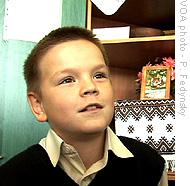 |
| Alexander Kolomayets |
Not surprisingly, Alexander Kolomayets, an elementary student at Simferopol's all-Ukrainian school, feels comfortable speaking Russian with friends.
Alexander says that when necessary, he and his friends speak Russian and switch into the language occasionally when they relax.
Some young people say speaking Ukrainian is cool or patriotic11; those who grew up speaking Russian say their language is a fact of life and that they are no less patriotic Ukrainians. Ultimately, the resolution of Ukraine's linguistic12 divide may depend upon the recognition that learning any language is a difficult task that requires dedication13 and patience.




